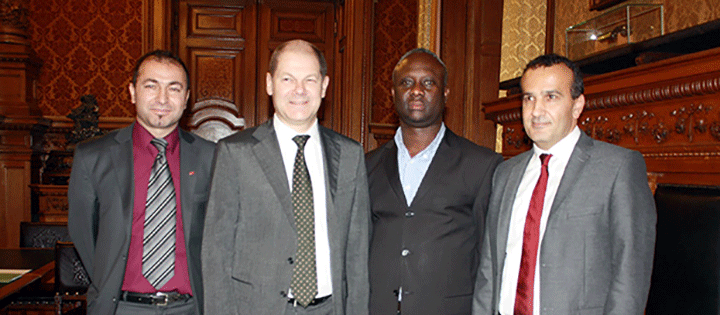The last time I had a one-on-one meeting with our chancellor was a decade ago when he served as the mayor of Hamburg. Now, I find myself preparing to travel to Berlin using the "49€ Deutschland Ticket" to meet him. I must admit it won't be easy, and there's a chance I might return without meeting him.
Nevertheless, I can still convey my mission to Berlin to the chancellor's secretary: "The Impact of Immigration on Germany's Society" and the necessity to formulate favorable policies for immigrants. Making life difficult for them would have negative consequences for everyone. The era of "Ausländer Raus!" policies needs to come to an end.
Today, I woke up early in the morning to catch the bus to the inner city. To my surprise, the bus was full of migrants, including the bus driver. Being naturally inquisitive, I asked about their missions. One was heading to clean an office where important bank transactions take place, while the other had just finished cleaning the cinema, a place where people unwind and relieve their stress. When I mentioned that I was on my way to meet the "Bundeskanzler," they seemed to assume that I must be a very important person.
Upon arriving at the train station, I encountered some young migrants diligently cleaning the station, and it was evident that they were already fatigued. I empathized with them, as I, too, often feel tired, especially during meetings with German intellectuals who speak rapidly and use words I haven't encountered before. Recently, one of my young associates remarked that I appeared fatigued during such meetings, to which I responded with a simple "Ayoo."
Interestingly, the train driver himself turned out to be a migrant. At the main train station, as I sought a cup of hot coffee, I encountered another migrant worker.
To my surprise, the train departed punctually, which was unexpected as the "Deutsche Bahn" is typically considered less punctual than other aspects of German society. While Germans are renowned for their punctuality, German National Trains have a reputation for being frequently delayed.
Furthermore, the young man serving on the train was a gentleman I knew personally, and we engaged in some light-hearted conversation during the journey. Upon our timely arrival in Berlin, I needed to make a quick visit to a good friend who was hospitalized. Once again, I encountered migrant professionals in the medical field: the nurse on duty was a migrant, and the doctor was a foreigner.
At this juncture, I couldn't help but ponder what would happen to the German economy if all these foreigners were non-existent. To be honest, immigrants in Germany make a net contribution to the public budget amounting to billions of Euros, not to mention the countless jobs they have created, along with their consistent tax payments and contributions to pension schemes.
As I prepare for today's meeting with the chancellor, I realize that I have a lot to discuss with him and his team. It is crucial that we formulate friendly and welcoming policies towards foreigners for the betterment of all. We are, after all, in the same boat, and it is the foreigners who help keep that boat in balance. If the cry of "Ausländer Raus!" prevails, the entire boat will ultimately sink.
Desmond John Beddy
https://beddy.de
Sidebar
Magazine menu

 Teline V
Best News Template For Joomla
Teline V
Best News Template For Joomla
20
Fri, Sep
13
New Articles










